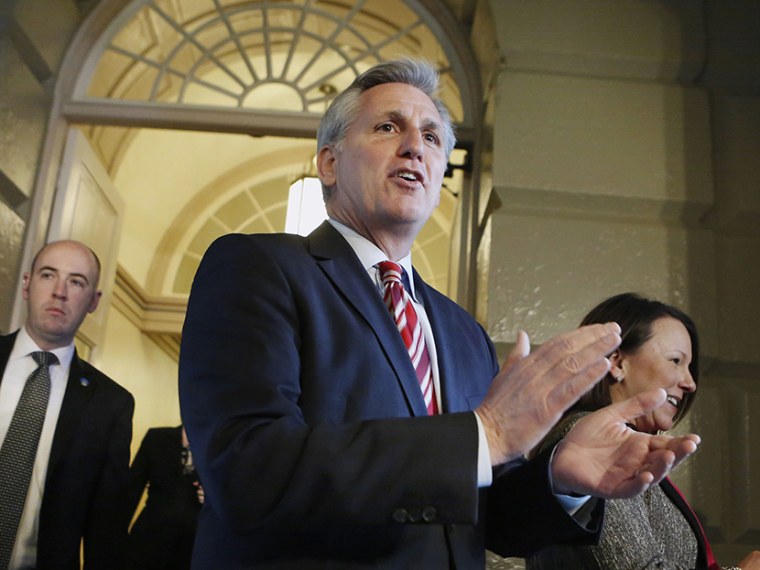After Rep. Kevin McCarthy (R-Calif.) was chosen as the new House Majority Leader, a reader emailed to ask whether it's unusual for someone to move so quickly up the ladder in his fourth term in Congress.
As Igor Bobic reported, research from the University of Minnesota's Humphrey School of Public Affairs shows that the answer is an emphatic yes.
When he assumes the second most powerful post in the GOP leadership in July, McCarthy will have just seven years, six months and 29 days of public service under his belt, the least experience of any floor leader in the chamber's history by more than a year. The previous lawmaker to hold that distinction was then-Rep. Roy Blunt (R-Mo.), who served eight years, eight months and 25 days before ascending to acting majority leader. McCarthy will also have served almost 10 years less than the average incoming leader, who had served more than 17 years in office, according to the study.
Eric Ostermeier, who wrote the study, explained, "In general, Republicans have elected floor leaders with less experience than have Democrats over the decades. The average length of service for the 20 Democrats at the time they first became floor leader was 6,843 days, or more than 18.5 years. Meanwhile, the 17 Republican floor leaders had served an average of 5,385 days, or approximately four fewer years."
It's tempting to assume, then, that McCarthy is truly extraordinary, doing far more in his seven years in Congress than most with more experience, but that's clearly not the case. As Bobic also discovered, McCarthy has only sponsored three bills during his Capitol Hill tenure, and only two of them actually passed.
One renamed a post office; the other renamed a flight research center.
So what's going on here?
For one thing, we appear to be in an era in which experience in public office matters less, especially in Republican politics. Two years ago, for example, Mitt Romney, with only four years in public office under his belt, became the least experienced major-party presidential nominee in more than 70 years. This detail, though striking, went almost completely unmentioned during the GOP primaries and general election -- no one seemed to care.
This also doesn't seem likely to discourage other inexperienced officials, including Ted Cruz and Rand Paul, from launching presidential campaigns of their own in the near future.
What's more, especially in the House GOP majority, accomplishments, expertise, competency, and legislative records aren't the sort of thing members consider when looking for leaders, at least not anymore. McCarthy had cultivated personal relationships with much of his caucus -- as rival Raul Labrador told reporters last week, the California Republican knew "the names of spouses," while he did not -- and that proved to be more than enough.
But with Speaker John Boehner's (R-Ohio) future uncertain, this nevertheless leaves McCarthy well positioned to lead the House in the not-too-distant future, despite a very thin resume and an extremely brief tenure in Congress.
